| 28 January |
• yesterday • tomorrow |
| Memorial of Saint Thomas Aquinas, Priest and Doctor of the Church |
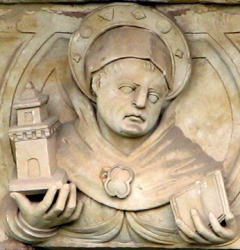
• 7 March (Fossanuova monastery near Terracina, Italy)
• 13 November as patron of Catholic schools (on the Dominican calendar from 1924 to 1962)
• Angelic Doctor
• Doctor Angelicus
• Doctor Communis
• Great Synthesizer
• The Dumb Ox
• The Universal Teacher
Son of the Count of Aquino, born in the family castle in Lombardy near Naples, Italy. Educated by Benedictine monks at Monte Cassino, and at the University of Naples. He secretly joined the mendicant Dominican friars in 1244. His family kidnapped and imprisoned him for a year to keep him out of sight, and deprogram him, but they failed to sway him, and he rejoined his order in 1245.
He studied in Paris, France from 1245 to 1248 under Saint Albert the Great, then accompanied Albertus to Cologne, Germany. Ordained in 1250, then returned to Paris to teach. Taught theology at University of Paris. He wrote defenses of the mendicant orders, commentaries on Aristotle and Lombard's Sentences, and some bible-related works, usually by dictating to secretaries. He won his doctorate, and taught in several Italian cities. Recalled by king and university to Paris in 1269, then recalled to Naples in 1272 where he was appointed regent of studies while working on the Summa Theologica.
On 6 December 1273 he experienced a divine revelation which so enraptured him that he abandoned the Summa, saying that it and his other writing were so much straw in the wind compared to the reality of the divine glory. He died four months later while en route to the Council of Lyons, overweight and with his health broken by overwork.
His works have been seminal to the thinking of the Church ever since. They systematized her great thoughts and teaching, and combined Greek wisdom and scholarship methods with the truth of Christianity. Pope Leo VIII commanded that his teachings be studied by all theology students. He was proclaimed a Doctor of the Church in 1567.
c.1225 at Roccasecca, Aquino, Naples, Italy
• 7 March 1274 at Fossanuova monastery near Terracina, Italy of apparent natural causes
• relics interred at Saint-Servin, Toulouse, France
• relics translated to the Church of the Jacobins, Toulouse on 22 October 1974
18 July 1323 by Pope John XXII
• academics
• against storms
• against lightning
• apologists
• book sellers
• Catholic academies
• Catholic schools (proclaimed on 4 August 1880 by Pope Leo XIII)
• Catholic universities
• chastity
• learning
• pencil makers
• philosophers
• publishers
• scholars
• schools, colleges, universities
• students, school children
• theologians
• University of Vigo
• Aquino, Italy
• Aquino-Pontecorvo, Italy, diocese of
• Belcastro, Italy
• Falerna, Italy
• Sora-Aquino-Pontecorvo, Italy, diocese of
• chalice
• dove, usually speaking into his ear, sometimes as he writes
• monstrance
• ox
• star
• sun
• teacher with pagan philosophers at his feet
• teaching
• person trampled under foot
• Saint Thomas Aquinas of the Order of Preachers, by Father Placid Conway, OP
• Saint Thomas Aquinas, by G K Chesterton
Grant me, O Lord my God, a mind to know you, a heart to seek you, wisdom to find you, conduct pleasing to you, faithful perseverance in waiting for you, and a hope of finally embracing you. - Saint Thomas Aquinas
Charity is the form, mover, mother and root of all the virtues. - Saint Thomas Aquinas
We are like children, who stand in need of masters to enlighten us and direct us; and God has provided for this, by appointing his angels to be our teachers and guides. - Saint Thomas Aquinas
If you seek the example of love: "Greater love than this no man has, than to lay down his life for his friends." Such a man was Christ on the cross. And if he gave his life for us, then it should not be difficult to bear whatever hardships arise for his sake. If you seek patience, you will find no better example than the cross. Christ endured much on the cross, and did so patiently, because "when he suffered he did not threaten; he was led like a sheep to the slaughter and he did not open his mouth." If you seek an example of obedience, follow him who became obedient to the Father even unto death. "For just as by the disobedience of one man," namely, Adam, "many were made sinners, so by the obedience of one man, many were made righteous." If you seek an example of despising earthly things, follow him who is "the King of kings and the Lord of lords, in whom are hidden all the treasures of wisdom and knowledge." Upon the cross he was stripped, mocked, spat upon, struck, crowned with thorns, and given only vinegar and gall to drink. Do not be attached, therefore, to clothing and riches, because "they divided my garments among themselves." Nor to honors, for he experienced harsh words and scourgings. Nor to greatness of rank, for "weaving a crown of thorns they placed it on my head." Nor to anything delightful, for "in my thirst they gave me vinegar to drink." - from the writings of Saint Thomas Aquinas
The only-begotten Son of God, wanting to make us sharers in his divinity, assumed our nature, so that he, made man, might make men gods. - Saint Thomas Aquinas
Believing is an act of the intellect assenting to the divine truth by command of the will moved by God through grace. - Saint Thomas Aquinas
Most loving Lord, grant me a steadfast heart which no unworthy desire may drag downards; an unconquered hear which no hardship may wear out; an upright heart which no worthless purpose may ensnare. Impart to me also, O God, the understanding to know you, the diligence to seek you, a way of life to please you, and a faithfulness that may embrace you, through Jesus Christ, my Lord. Amen. - Saint Thomas Aquinas, from Something of a Saint
Hence we must say that for the knowledge of any truth whatsoever man needs divine help, that the intellect may be moved by God to its act. But he does not need a new light added to his natural light, in order to know the truth in all things, but only in some that surpasses his natural knowledge. - Saint Thomas Aquinas
https://catholicsaints.info/saint-thomas-aquinas/

• Carlus Magnus
• Carolus Magnus
• Charles the Great
• Charles, King of the Franks
• Karl der Grosse
Born a prince, the eldest son of Bertha and Pepin the Short, Mayor of the Palace under King Childeric III and then King of the Franks in 751. Married, and father of Louis the Pious. King of the Franks in 768. As "Roman Patrician" Charles was obligated to defend the temporal rights of the Holy See, which were first threatened by the Lombards under Desiderius, whom he finally defeated at Pavia, Italy. Defeated the pagan Saxons, to whom he gave the alternative of baptism or death; their leader Wittekind accepted Christianity in 785. The Song of Roland recounts the death of the paladin Roland during Charlemagne's 777 invasion of Moslem Spain. Crowned the first Holy Roman Emperor, sovereign of Christendom in the West, by Pope Leo III on Christmas Day 800.
The reign of Charlemagne involved a greater degree of organic development and consolidation of Christian Europe than any other person. He supported agricultural development in his realm, organized and codified the principles of ancient Frankish law, and through the scholars whom he attracted to his court, including Saint Alcuin, he inaugurated educational reform. He furthered the spiritual welfare of the Church by his zeal for ecclesiastical discipline and took keen interest in the deliberations of synods. He improved and propagated church music, laying the foundations of modern musical culture. In 806 he divided his empire by will among his three sons.
Charlemagne is the hero of a cycle of romance in the Middle Ages. He first appeared as a legendary figure in the book of the so-called Monachus Sangallensis (883). In France he became the center of the national epics, or "Chansons de Geste," which relate his legendary deeds and those of his paladins (Oliver, Roland, Turpin), and vassals. In the older epics he is the incarnation of majesty, truth, and justice, and the champion of God's church against the infidel, but the later epics paint him as a tyrant and oppressor. His Saxon wars left many legends in Germany, concerned mainly with Wittekind and his conversion, which, according to the French version, was short-lived and insincere. Through French influence the Carlovingian legend spread to other countries; in Italy it inspired the Franco-Italian epics, and the "Reali di Francia" of Mignabotti, and culminated in the famous chivalrous epics of Boiardo and Ariosto; in Germany it appeared in the "Rolandslied" of Konrad der Pfaffe, "Karlmeinet," and the chap-books of the 15th century; in Scandinavia in the "Karlamagnus saga" (c.1300); in the Netherlands in numerous translations like "Carel ende Elegast"; and in England Caxton published "The Lyf of Charles the Grete" (1485) and "The four sonnes of Aymon" (1486).
2 April 742 Aix-la-Chapelle (in modern Germany
28 January 814 at Aachen (in modern Germany) of natural causes
by Pope Benedict XIV (cultus confirmed)
a decree of canonization was issued by the anti-pope Paschal III, but this was never ratified by valid authority
University of Paris
https://catholicsaints.info/blessed-charlemagne/
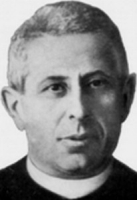
Moses Tovini
Eldest of eight children, the son of Eugenio, an accountant, and Domenica Malaguzzi, a teacher. Nephew and god-son of Blessed Giuseppe Tovini. Attended elementary school in Breno, Italy, and was a good student. Moved in with Blessed Giuseppe in Brescia, Italy at age nine to continue his studies. He made his First Communion on 14 November 1886. Went to school in Romano Lombardia, Italy in 1889. Mose began to feel a call to the priesthood, but his father opposed it, and he put off the training. Attended high school in Celana, Bergamo, Italy, but had trouble with city life, and was abused by his fellow students. He returned home, and this time his father agreed with Mose's call to the priesthood. The boy moved back in with his uncle Giuseppe, and studied at the seminary in Brescia.
Upon finishing the minor seminary, during which his uncle had died, Mose took off from school and joined the army. His personal piety even impressed his fellow soldiers. He reached the rank of sergeant, was discharged on 31 October 1898, returned home, and resumed his studies for the priesthood. Ordained in Brescia on 9 June 1900 at age 22. Assigned as chaplain of Astrio, Italy. He was soon sent to Rome, Italy to continue his studies, and by 1904 had degrees in mathematics, philosophy, and theology. He returned home to Brescia, and in November 1904 began teaching at the seminary; he would continue in that job for the rest of his life, and was known for the orthodox Christianity of his lessons. Joined the new Congregation of Oblate Priests. Studied in Milan, Italy, and received a degree in dogmatic theology. He organized religious education for teachers, assisted in local parish work, and endlessly taught catechism.
Appointed parochial vicar at Provaglio d'Iseo in 1915. He received an exemption from the draft of World War I, and continued to teach. Vice-pastor of the parish of Torbole, Italy after its priest was drafted. Ministered fearlessly to the sick during the Spanish flu epidemic. After the war, he was assigned to help returning veterans resume their seminary studies. Appointed vice-prior of the Diocesan Commission of the Catechism in 1919. In 1922, he and Father Giuseppe Schena founded the Catholic Action Movement in Italy. Appointed canon of the Brescia cathedral and vice-official of the ecclesiastical tribunal in 1923. Director of the institute for Training Catechism Teachers in Brescia in 1926 where he helped prepare hundreds of catechists. Rector of the Brescia seminary in 1926, a post he held the rest of his life; his administration always emphasized devotion to the Eucharist, the Immaculate Virgin and the Pope as the great pillars of priestly vocation.
27 December 1877 in Cividate Camuno, Brescia, Italy
28 January 1930 in Brescia, Italy of pneumonia
• 17 September 2006 by Pope Benedict XVI
• celebrated at the cathedral in Brescia, Italy
https://catholicsaints.info/blessed-mose-tovini/
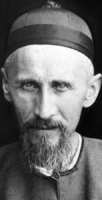
• Giuseppe Freinademetz
• Joseph of Shantung
• Jozef Freinademetz
• Ujoep (nickname)
Born into a pious farm family, the fourth of twelve children. Joseph was a polymath who knew seven languages. Ordained in Bressanone, Italian Tyrol on 25 July 1875. Joined the Divine Word Missionaries when the congregation was only three years old. Missionary to China in 1879; he spent the rest of his life there, and did all he could to be Chinese in order to convert the Chinese.
He worked initially with Franciscan missionaries so he and his group could get acclimated. The bishop of Hong Kong planned to put Father Joseph in charge of the group, and later to ordain him as bishop; Joseph refused to leave the bishop's office until his superior had changed his mind and given the honor to some one else.
It was a time of persecution of Christians in China; many in authority resented foreigners of any sort, and others were openly anti-Christian no matter if the faithful were native or foreign. Father Joseph, his co-workers and his flock were chased from place to place, arrested, routinely beaten. Joseph is reported to have preached to his attackers while they were beating him; they were so moved and impressed, they left.
The abuse of the missionaries led to some foreign governments to dispatch armed forces to China to protect them. The Chinese government reacted by expelling all foreigners. Father Joseph stayed to minister covertly to the converts, finally resuming his work openly after the deportation orders were lifted. On the roads and from the mission, he worked to teach and convert up to the very end of his life.
15 April 1852 in Pedraces in Val Gadena, the Tyrolean Alps, Italy
28 January 1908 in Taikia, China of tuberculosis and typhus
5 October 2003 by Pope John Paul II
Love is the only language everyone understands. - Saint Joseph
I want to be a Chinese in heaven. - Saint Joseph
https://catholicsaints.info/saint-joseph-freinademetz/
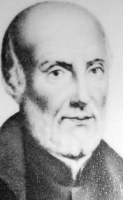
• Julien Maunoir
• Apostle of Brittany
2 July (Jesuits)
Raised in a pious home. Classmate of Saint Isaac Jogues. Joined the Jesuits in 1625. Regent of the College of Quimper from 1630 to 1633. Ordained on 6 June 1637. Successfully fought secret societies in Brittany, France. Built homes for the aged in the French cities of Vannes and Quimper.
Having learned the Breton language, and developed a phonetic Breton alphabet while teaching in Quimper, Julian was well suited for evangelizing the impoverished people of Brittany. Though he requested to go do missionary work in Canada, he was assigned as a home missioner for 43 years, holding 375 missions and becoming the principal cause of religious renewal in the province. His missions sometimes attracted 10,000 to 30,000 people; he had to bring in several parish priests to help hear confessions, catechize, and distribute Communion. In 1651, seven of these priests asked permission to join Julian in his work, and the group became known as the Breton Missionaries. By 1665 there were 300, and by 1683 almost 1000.
1 October 1606 at Saint-Georges-de-Reitembault, France
• 8pm on 28 January 1683 at Plévin, France of natural causes
• buried in the parish church at Plévin
20 May 1951 by Pope Pius XII
https://catholicsaints.info/blessed-julian-maunoir/
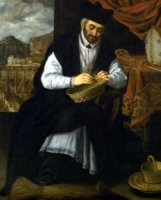
Julian of Burgos
Educated at the cathedral school of Burgos, Spain and the University of Palencia, Spain. Taught theology and philosophy at Palencia from 1153 to 1163. Worked on the side making basket and trade goods for extra money, and then would gave away almost everything to the poor. In 1163 he retired to live as a hermit outside Palencia. Ordained in 1166. He and a fellow hermit, Lesmes, became wandering preachers. Archdeacon of the Archdiocese of Toledo, Spain in 1191 where he served as administrator, preacher - and basket weaver to make money for the poor. When King Alphonsus IX recaptured Cuenca of Castile from the Moors, Julian became its bishop in June 1196. He was known as a reformer and noted preacher whose charity extended to everyone, regardless of faith. (And, yes, he continued making baskets).
1127 at Burgos, Spain
• 28 January 1208 in Cuenca, Spain of natural causes
• relics re-interred under the altar dedicated to him in the cathedral of Cuenca, Spain in 1578
18 October 1594 by Pope Clement VIII
• basket makers
• for rain
• Cuenca, Spain, city of
• Cuenca, Spain, diocese of
bishop making baskets with his mitre and crozier laying nearby
https://catholicsaints.info/saint-julian-of-cuenca/
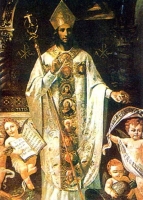
Paulinus II
2 March (in Cividale, Italy)
Raised on a farm, and broadly self educated, gaining a wide reputation for scholarship. Teacher. Invited courtier to Charlemagne begining in 774, he was named "royal master of grammar". He served at court for over a decade and became a favorite of the emperor. Poet. Reluctant Patriarch of Aquileia in northern Italy in 787. He attended all the great councils convoked during his time, and well known as a defender of the faith against heretics. Fought the heresy of Adoptionism, and convoked a synod to combat several heresies that denied Christ's Divine nature; two surviving works attributed to him combat this heresy. He dispatched and supported missionaries to pagan territories, and ordered them not to force conversions, or baptize those ignorant of the Faith or who thought it was some type of magic. Noted preacher in the area of Styria and Crinthia.
c.726 Premariacco near Cividale, Italy
• 11 January 804 of natural causes
• relics are under the altar of the crypt of the basilica of Cividale del Friuli, Italy
https://catholicsaints.info/saint-paulinus-of-aquileia/
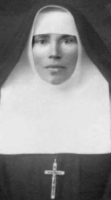
• Olga
• Olha
• Ol'ha
• Olimpia
27 June as one of the Martyrs Killed Under Communist Regimes in Eastern Europe
Greek Catholic. Joined the Congregation of the Sisters of Saint Joseph. Worked in several towns as a catechist and novice director, and with the aged and sick. Taught and helped to raise several young women. Convent superior in Kheriv where the Communists worked against her. Arrested for her faith in 1951, and exiled to a forced labour camp in the Tomsk region of Siberia in Russia. In the camp she continued her duties as superior, and organised other exiled nuns into prayer and support groups. Martyr.
1903 at Tsebliv, L'vivs'ka oblast', Ukraine
28 January 1952 in Kharsk, Tomskaya oblast', Russia
27 June 2001 by Pope John Paul II in Ukraine
https://catholicsaints.info/blessed-olympia-bida/
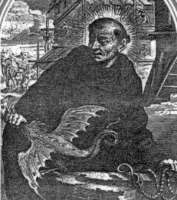
Jean of Réomé
Hermit at Réomay, France. His reputation for holiness spread, and he began to attract would-be disciples. To escape them he sneaked away, and became a monk at Lérins Abbey. He was sent by his bishop back to Reomay as abbot of its monastery, which became Mount Saint Jean in his honour. He became one of the pioneers of Western monasticism. So strict in his refusal to be around women, he refused to receive his own mother when she visited the monastery.
425 at Dijon, France
25 January 539 at Réomay, France of natural causes
Benedictine hermit or monk or abbot near a well with a dragon on a chain
https://catholicsaints.info/saint-jean-of-reomay/
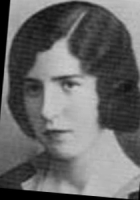
Baptized at the age of two days, and Confirmed on 18 March 1907 at the parish of Saint Andrew the Apostle. Well-educated lifelong lay woman in the archdiocese of Valencia, Spain who spent years caring for her parents. Member of Catholic Action. Attended daily Mass. Had a deep devotion to the Blessed Virgin Mary. Served as a catechist and minister to the poor and sick. Martyred in the Spanish Civil War along with several members of her family.
3 May 1901 in Valencia, Spain
28 January 1937 in Picassent, Valencia, Spain
11 March 2001 by Pope John Paul II
https://catholicsaints.info/blessed-maria-luisa-montesinos-orduna/
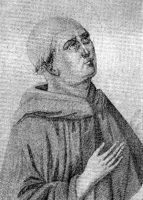
Born to the nobility. Camaldolese lay brother at the monastery of San Frediano, Pisa, Tuscany, Italy. Miracle worker.
Pisa, Italy
• 28 January 1224 at the monastery of San Frediano, Pisa, Tuscany, Italy of natural causes
• buried under the main altar in the church at the San Frediano monastery
• most relics destroyed in a fire in the church in 1675; remaining relics enshrined in the church sacristy
1857 by Pope Pius XI (cultus confirmation)
https://catholicsaints.info/blessed-bartolome-aiutamicristo/
Born wealthy. Studied law but left it for the priesthood. Restored a ruined hospital where he tended the sick and gave legal advice for free. When he discovered that the hospital had fallen into disrepair because its funding had been misappropriated, he successfully sued the bishop of Chiusi, Italy for return of the funds; the bishop had him killed by paid hitmen.
at Citta delle Pieve (Chiusi), Lombardy, Italy
• murdered on 15 January 1304
• buried in a stand of trees
• body discovered by a group of shepherds who found the trees near his grave in full bloom in the dead of winter
https://catholicsaints.info/blessed-james-the-almsgiver/

• Hieronymus Lu Tingmei
• Jerome Lou-Tin-Mei
• Lu Tingmei Hieronymus
• Yeilou
28 September as one of the Martyrs of China
Lay man catechist. Martyr.
c.1811 at Langdai, Guizhou, China
tortured and beheaded on 28 January 1858 at Mao-Cheu, Langdai, Guizhou, China
1 October 2000 by Pope John Paul II
https://catholicsaints.info/saint-jerome-lu/
A soldier when young, Odo initially planned on a military career. He gave up the military life to become a Benedictine monk at Corbie, France under Saint Pascasius Radbert. Tutor to the sons of Charles Martel. Abbot in 851. Bishop of Beauvais in 861. Known as a reformer in his diocese. Mediator between Pope Nicholas I and Archbishop Hincmar of Rheims, France.
801 at Beauvais, Picardy, France
880 of natural causes
by Pope Pius IX (cultus confirmed)
https://catholicsaints.info/blessed-odo-of-beauvais/
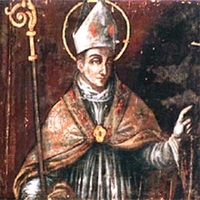
Emiliano, Miliano
Fourth-century bishop of Trebi, Italy. Tortured and martyred in the persecutions of Diocletian.
Armenian
• tied to an olive tree and beheaded on 28 January 304 about two miles outside Trevi, Italy
• relics re-discovered in 1660 during work on the cathedral of Spoleto, Italy
Trevi, Italy
https://catholicsaints.info/saint-aemilian-of-trebi/
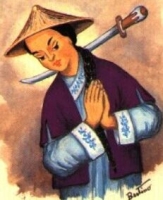
• Agatha Lin Tchaio
• Lin Zhao Agatha
• Jiade
28 September as one of the Martyrs of China
Lay woman. Teacher in a Christian school. Catechist. Martyr.
c.1817 at Qinglong, Guizhou, China
beheaded 28 January 1858 at Mao-ken, Langdai, Guizhou, China
1 October 2000 by Pope John Paul II
https://catholicsaints.info/saint-agatha-lin/
James the Palestinian
James spent a wild youth, but became a convert to Christianity. Lived as a hermit for 15 years. At one point he lost his faith, and committed several crimes, one of which may have been murder. He was ready to abandon his faith, and his life, but an anchorite friend convinced him of the limitless forgiveness of God. James returned to the Church, moved into an abandoned sepulchre, and spent the rest of his life in prayer and penance.
https://catholicsaints.info/saint-james-the-hermit/
Goddaughter of Saint Bathilde who helped raise her in the monastery of Chelles. The little girl died a few days before Bathilde, and devotion for Bathilde began to take in the holy little girl Radegonde, as well.
c.673
• c.680 in Chelles Abbey
• buried in the abbey church of Santa Cross
• in 833 her relics were transferred to the church of Our Lady of Chelles were united with those of Saint Bathilde
https://catholicsaints.info/saint-radegonde-of-celles/
• Lawrence Ouang
• Lawrence Wang Bing
28 September as one of the Martyrs of China
Layman catechist in the apostolic vicariate of Guizhou. Martyr.
c.1802 in Yuyang, Guizhou, China
beheaded on 28 January 1858 in Maokou, Langdai Co., Guizhou, China
1 October 2000 by Pope John Paul II
https://catholicsaints.info/saint-lawrence-wang/
Layman martyr in the apostolic vicariate of Korea.
1732 in Hongju, Chungcheong-do, South Korea
28 January 1793 in Jeonju, Jeolla-do, South Korea
15 August 2014 by Pope Francis
https://catholicsaints.info/blessed-petrus-won-si-jang/
Cainder, Kinnera
Friend of Saint Senan. Anchoress near Bantry, Ireland.
Irish
• c.530 of natural causes
• buried on Saint Senan's Island, Enniscarthy, Ireland
https://catholicsaints.info/saint-cannera-of-inis-cathaig/
Glastianus
Mediated a peace between the Picts and the Scots, greatly improving the conditions of the conqured Picts.
830 of natural causes
Kinglassie, Fife, Scotland
https://catholicsaints.info/saint-glastian-of-kinglassie/
Martyred in the persecutions of Decius.
• 251 at Apollonia, Phrygia (modern Turkey)
• relics translated to Constantinople
• relics translated to assorted churches in Spain
https://catholicsaints.info/saint-thyrsus-of-apollonia/
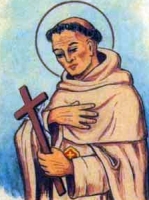
Mercedarian friar. Doctor of Theology. Assigned to north Africa, he ransomed 259 Christians from Muslim slavery.
https://catholicsaints.info/blessed-giovanni-of-medina/
Daughter of Constantine the Great. Healed of an unnnamed mortal illness a the tomb of Saint Agnes of Rome, she converted to Christianity. Lived the rest of her life near the tomb with a group of like-minded women that today would be nuns.
https://catholicsaints.info/saint-constantly/
• Meallan of Cill Ruis
• Meallan of Kilrush
An Irish priest, he received a blessing from Saint Patrick for his desire for religious work.
https://catholicsaints.info/saint-meallan-of-cell-rois/
Cistercian monk. Appointed abbot of Vaucelles Abbey, France, by Saint Bernard of Clairvaux.
England
1169 of natural causes
https://catholicsaints.info/saint-richard-of-vaucelles/
Roman deputy prefect. Martyred in the persecutions of Diocletian.
304 in Civitavecchia, Italy
https://catholicsaints.info/saint-flavian-of-civitavecchia/
Hermit in the desert near Antioch, Syria. Friend of Saint Simeon.
390 of natural causes
https://catholicsaints.info/saint-palladius-of-antioch/
Martyred in the persecutions of Decius.
251 at Apollonia, Phrygia (modern Turkey)
https://catholicsaints.info/saint-leucius-of-apollonia/
Martyred while on pilgrimage to Rome, Italy.
Scotland
Picardy, France
https://catholicsaints.info/saint-brigid-of-picardy/
Martyred while on pilgrimage to Rome, Italy.
Scotland
Picardy, France
https://catholicsaints.info/saint-maura-of-picardy/
Martyred with a group of fellow Christians in the persecutions of Diocletian.
https://catholicsaints.info/saint-leonides-of-thebaid/
Eighth century abbot of the Benedictine Abbey of Brantôme, France.
https://catholicsaints.info/saint-antimus-of-brantome/
Martyred in the persecutions of Decius.
251 at Apollonia, Phrygia (modern Turkey)
https://catholicsaints.info/saint-callinicus/
Lived in Cornwall, England. No other information is available.
Irish
https://catholicsaints.info/saint-archebran/
A group of 4th-century parishioners in Alexandria, Egypt. During the celebration of Mass one day an Arian officer named Syrianus led a troop of soldiers into their church and proceded to murder all the orthodox Christians in the place.
356 in Alexandria, Egypt
https://catholicsaints.info/martyrs-of-alexandria-28-january/
• Gentile Giusti
CatholicSaints.Info Portable Edition